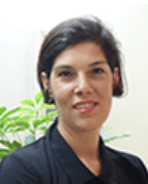
Dr. Hagit Refaeli Mishkin
Dr. Hagit Refaeli Mishkin, 48, a mother of three from Israel, was brutally murdered by Hamas terrorists on the day of the terrible massacre that took place on Saturday, October 7, in the south of Israel.
Dr. Hagit Refaeli Mishkin had a Ph.D. in Science and Technology Education from the Technion and taught Science in a middle school and high school in Hod Hasharon.
During the years 2015 -2023, Dr. Hagit Refaeli Mishkin was a member of the Mofet Institution a central multicultural hub connecting institutions and agencies across the education field, including academic institutions for teacher education and educational research, local and national governmental entities led by the Ministry of Education, and social organizations.
As an educator, she sought to coordinate and collaborate with faculty in the teacher education institutes to promote and implement programs that would activate educational change processes that can bring about crucial improvements in the teaching profession and teacher education.
In the years 2015-2016, she was a team member at the Academia-Classroom program. The program’s purpose was to change the teaching training process and promote the transition to “co-teaching” in the classes.
“Academia Class” is a program initiated by the Israeli Ministry of Education. The program focuses the main practical experience on the period at the end of the student-teacher training and emphasizes the importance of the continuous and intensive nature of the practicum. The program emphasizes collaboration between the school and the college and constitutes a substantially different type of practicum from the traditional model, both because of the close guidance of the training teacher, using the practical model of co-teaching and also because of the large scope of responsibility imposed on the student-teachers.
Studies which examine the success of the Academia Class program found that it had significant advantages for student-teachers who graduated from the program for their integration in their practicum year and they had a stronger probability of subsequently working in teaching (Macdusi, 2018). Graduates of the program increased their sense of efficacy and were better prepared for the teaching role both in the classroom and in the school organization in comparison to student-teachers who underwent traditional practicum experience (Eran & Zaretski, 2017).
In the years 2017-2023, Hagit was the head of the TESFA (‘hope’ in Amharic) program.
In light of data showing that teachers of Ethiopian descent are under-represented in the education system, the Israeli Ministry of Education defined their integration as a key goal and is working on several fronts to implement the goal, one of which is the Tesfa program. This is a holistic program for the quantitative and qualitative integration of teachers of Ethiopian descent in the education system while promoting a multicultural and accepting culture. The program has been in operation in teacher education institutes for the past 13 years, and students of Ethiopian descent study in special tracks alongside the rest of the student population. The program’s main fields are:
- Developing academic learning skills and acquisition of pedagogic tools for teaching in the education system.
- Developing students’ personal skills and educational leadership.
- Acquisition of education tools for coping with being the social “other” in Israeli society by promoting tolerance for multiculturalism and respect for all people (Schatz-Oppenheimer, 2015).
In their first years of placement, the program offers mentoring to teachers of Ethiopian descent who are interested in this support. As a result, the number of Ethiopian-descended teachers entering and persevering in the education system has more than doubled in the last decade.
Another main field of the TESFA program was to coordinate collaboration with faculties in the teacher education institutes to promote and implement these goals through multicultural courses, informal activities, conferences, and personal mentoring.
In the years 2021-2023, Dr Refaeli Mishkin participated in the TEC International Online Day. Those days deal with education for tolerance, ties between cultures, educational collaboration, and the use of educational models for breaking stigmas and building trust between different cultures.
Hagit was an expert in pedagogical and action research with educators from marginalized communities. Her research areas are education in a multicultural society, The Tesfa program, and teachers of Ethiopian descent.
Hagit was an educator, social activist and Midburn (Israel’s version of the Burning Man festival) organizer, who worked tirelessly to create a better, more accepting, and tolerant society.
May her memory be a blessing.

